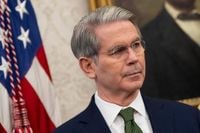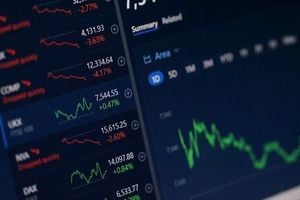In a turbulent week for the U.S. economy, Treasury Secretary Scott Bessent is reportedly contemplating his departure from the Trump administration following President Trump's controversial announcement of a "reciprocal tariff" policy. This move has raised alarms about its potential impact on both domestic and global markets, as reported by The New Republic on April 5, 2025.
During an appearance on MSNBC's Morning Joe, contributor Stephanie Ruhle revealed that Bessent, a former hedge fund manager, feels increasingly isolated within the administration. Sources suggest he may be seeking an exit to preserve his credibility, potentially eyeing a position at the Federal Reserve. Bessent's frustration stems from the administration's new tariff policy, which imposes a 10 percent baseline tariff on nearly all foreign goods. He has warned that such tariffs could escalate global trade tensions, urging foreign leaders not to retaliate.
Despite his previous stance downplaying the negative effects of tariffs, Bessent's concerns appear increasingly justified as the financial markets react negatively to the announcement. The Dow Jones and Nasdaq indices experienced their worst trading days since 2020, with significant losses attributed to the uncertainty surrounding the tariffs.
Market analysts have pointed out that Bessent's earlier assertions—that tariffs were merely price adjustments rather than inflationary—are now being challenged. Many experts, including Ruhle, argue that tariffs primarily hurt vulnerable Americans who rely on affordable imports for their daily needs.
Bessent's situation highlights the growing discontent among financial leaders regarding the administration's economic policies. A report from Bloomberg on April 4, 2025, indicated that Bessent has been sidelined during the formulation of the tariffs, which were crafted by a small group within Trump's inner circle, including ex-Cantor Fitzgerald CEO Howard Lutnick and economist Peter Navarro. This sidelining has left Bessent feeling powerless as hedge fund managers reach out to him for guidance amid market chaos.
In the wake of the tariff announcements, several major banks issued their largest margin calls to clients since the onset of the pandemic, signaling a significant tightening of financial conditions. The current environment has led to a sharp decline in equity long-short hedge funds, which fell by 1.7% on April 3, 2025, and are down 1.6% for the year. This downturn has prompted hedge funds to sell equities at their fastest rate since 2010.
Moreover, the effects of the tariff policy are rippling through the economy, with several initial public offerings (IPOs) being postponed. Companies like fintech firm Klarna, ticketing service Stubhub, and medtech company Medline have all halted their plans due to the uncertain market conditions created by the tariffs.
As the U.S. imported around $440 billion worth of goods from China in 2024, the implications of these tariffs are particularly significant. China accounted for a fifth of the iron and steel products imported into the U.S., more than a quarter of its electronics, a third of its footwear, and three-quarters of its toys. The stakes are high, and Bessent's warnings about potential retaliatory measures from foreign nations could exacerbate the situation.
Despite the turmoil, some analysts suggest that Bessent has the ability to influence treasury yields through strategic bond issuance. Guneet Dhingra, head of macro strategy at BNP Paribas, noted that Bessent could manipulate the market by adjusting the issuance of 10-year bonds and focusing on short-dated treasury bills. This maneuvering could complicate efforts to manage the yield curve amid the ongoing economic uncertainty.
In a broader context, the current economic climate reflects a significant shift from the previous administration's policies. Bessent, who has been credited with bringing intentionality to the chaotic financial landscape, faces a challenging environment where his influence appears diminished. His comments, such as, "The market consistently underestimates Donald Trump," reflect a recognition of the unpredictable nature of the current market.
As Bessent contemplates his future, the potential for his resignation raises questions about the administration's economic direction and the stability of the markets. Should he decide to leave, the market's reaction could be even more extreme than the current volatility.
In the meantime, the Trump administration is also introducing a "gold card" U.S. residency program, which is set to cost around $5 million and grant green card privileges to investors. This initiative adds another layer of complexity to the economic landscape as the administration seeks to attract foreign investment.
With Bessent's position becoming increasingly precarious, the coming weeks will be crucial in determining the future of U.S. economic policy and its impact on global markets. As financial leaders and analysts closely monitor the situation, the consensus remains that the administration's tariff strategy could have far-reaching consequences not just for the U.S., but for international trade relations as well.
As the dust settles from this week's announcements, one thing is clear: the economic landscape is shifting, and the ramifications of these decisions will be felt for years to come. Bessent's potential exit could mark a pivotal moment in this ongoing saga.




